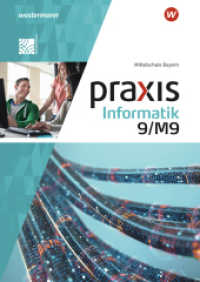Full Description
This book analyses the translation policies and practices of international non-governmental organisations (INGOs), engaging in critical questions around the ways in which translation can redress power dynamics between INGOs and the people they work with, and the role of activist researchers in contributing to these debates.
The volume examines the duality of translation and interpreting in INGOs, traditionally undervalued and under-resourced while simultaneously acknowledged as a powerful tool in ensuring these organisations work according to their own values of equal access to information, dialogue, and political representation. Drawing on over ten years of ethnographic fieldwork and interview data with a wide variety of INGOs, Tesseur offers unique insights into if and how INGOs plan for translation and interpreting needs while also critically reflecting on her own experience and the ways in which activist researchers like her can ensure social justice efforts are fully reflected in their own working practices. Encouraging a new interdisciplinary research agenda, the volume seeks to raise the profile of language and translation in humanitarian and development contexts and cross-disciplinary dialogue in scholarship on these issues.
The book will be of interest to scholars in translation and interpreting studies, sociolinguistics, development studies, and international relations.
Contents
Table of Contents
Chapter 1: Introduction
Introduction
INGOs, language, and T&I
Conceptual framework
Engaged research and critical reflexivity
A note on international development terminology
Underpinning research
Structure of the book
References
Chapter 2: Translation management in INGOs throughout history
Introduction
Save the Children UK: a history of language silence?
Organisational growth and restructuring as an incentive for translation management
Translation management choices and challenges: limitations of policies and internal services
Translation as a resource, as risk management, or as inclusion?
Concluding remarks
References
Chapter 3: Translating One Global Amnesty: Managing Amnesty's message and voice in translation
Introduction
Becoming One Global Amnesty
Amnesty press releases
Diverging views on the role of translation in a changing Amnesty
Discussion and concluding remarks
References
Chapter 4: Managing volunteer translation: On quality, risk, and ethics in Amnesty's Urgent Action translations
Introduction
Amnesty's global Urgent Action network
Managing volunteer translation: Amnesty Flanders (AIVL) network of Urgent Action translators
Translation output
Volunteer translation, risk, and social justice
Improving practice
Discussion and concluding remarks
References
Chapter 5: Language and translation ideologies in international NGOs: Explaining the paradox between English as a lingua franca and social justice values
Introduction
Language and translation ideology
Interview data
Narrative 2: Encourage mutual language learning and translation
Narrative 1: English as a lingua franca as the best possible solution
Concluding remarks
References
Chapter 6: Informal translation practices as empowerment? Balancing the need for access and dialogue with risk reduction
Introduction
Case study 1: Multilingual staff as informal translators and interpreters
Case study 2: Free machine translation at work: A tool for empowerment or risky business?
Case study 3: Translating COVID-19 health information as part of humanitarian crisis response
Concluding remarks
References
Chapter 7: Towards a more comprehensive approach to translating for social justice in international NGOs
Introduction
Key findings on T&I provision in INGOs in light of social justice values
Ideas for a more socially just approach to language and translation in INGOs
Key findings and implications for translation research and training
Limitations of the research
References
Chapter 8: Influencing translation policies as an activist researcher: Evaluating research impact and learning from linguistic choices
Introduction
Evaluating Research Impact
Linguistic reflexivity: a critical account of linguistic research choices
Concluding remarks








